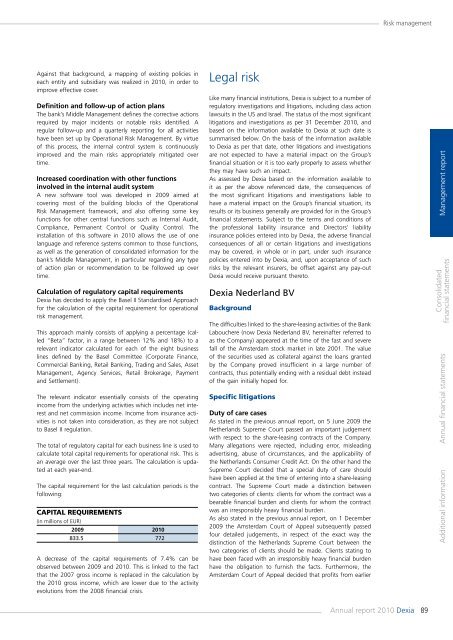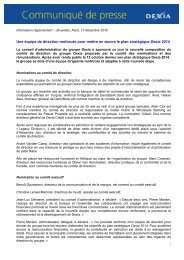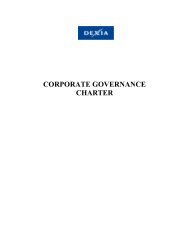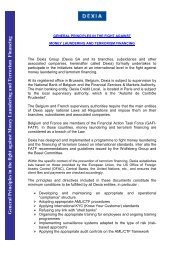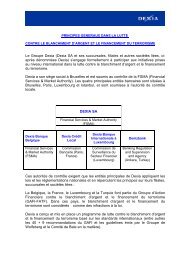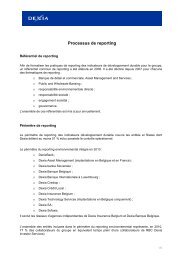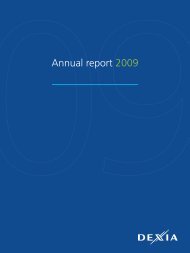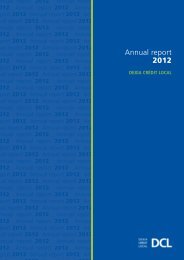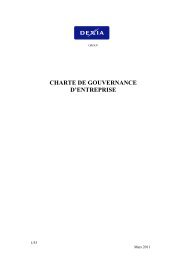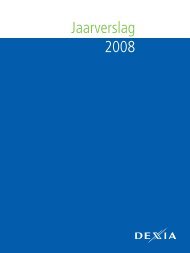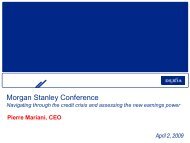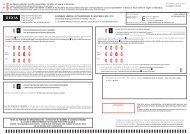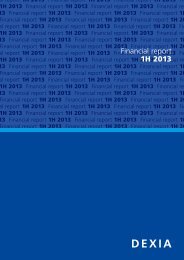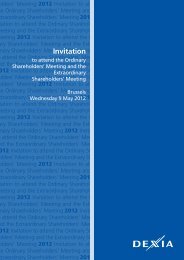Annual report 2010 - Dexia.com
Annual report 2010 - Dexia.com
Annual report 2010 - Dexia.com
- No tags were found...
Create successful ePaper yourself
Turn your PDF publications into a flip-book with our unique Google optimized e-Paper software.
Risk managementAgainst that background, a mapping of existing policies ineach entity and subsidiary was realized in <strong>2010</strong>, in order toimprove effective cover.Definition and follow-up of action plansThe bank’s Middle Management defines the corrective actionsrequired by major incidents or notable risks identified. Aregular follow-up and a quarterly <strong>report</strong>ing for all activitieshave been set up by Operational Risk Management. By virtueof this process, the internal control system is continuouslyimproved and the main risks appropriately mitigated overtime.Increased coordination with other functionsinvolved in the internal audit systemA new software tool was developed in 2009 aimed atcovering most of the building blocks of the OperationalRisk Management framework, and also offering some keyfunctions for other central functions such as Internal Audit,Compliance, Permanent Control or Quality Control. Theinstallation of this software in <strong>2010</strong> allows the use of onelanguage and reference systems <strong>com</strong>mon to those functions,as well as the generation of consolidated information for thebank’s Middle Management, in particular regarding any typeof action plan or re<strong>com</strong>mendation to be followed up overtime.Calculation of regulatory capital requirements<strong>Dexia</strong> has decided to apply the Basel II Standardised Approachfor the calculation of the capital requirement for operationalrisk management.This approach mainly consists of applying a percentage (called“Beta” factor, in a range between 12% and 18%) to arelevant indicator calculated for each of the eight businesslines defined by the Basel Committee (Corporate Finance,Commercial Banking, Retail Banking, Trading and Sales, AssetManagement, Agency Services, Retail Brokerage, Paymentand Settlement).The relevant indicator essentially consists of the operatingin<strong>com</strong>e from the underlying activities which includes net interestand net <strong>com</strong>mission in<strong>com</strong>e. In<strong>com</strong>e from insurance activitiesis not taken into consideration, as they are not subjectto Basel II regulation.The total of regulatory capital for each business line is used tocalculate total capital requirements for operational risk. This isan average over the last three years. The calculation is updatedat each year-end.The capital requirement for the last calculation periods is thefollowing:Capital requirements(in millions of EUR)2009 <strong>2010</strong>833.5 772A decrease of the capital requirements of 7.4% can beobserved between 2009 and <strong>2010</strong>. This is linked to the factthat the 2007 gross in<strong>com</strong>e is replaced in the calculation bythe <strong>2010</strong> gross in<strong>com</strong>e, which are lower due to the activityevolutions from the 2008 financial crisis.Legal riskLike many financial institutions, <strong>Dexia</strong> is subject to a number ofregulatory investigations and litigations, including class actionlawsuits in the US and Israel. The status of the most significantlitigations and investigations as per 31 December <strong>2010</strong>, andbased on the information available to <strong>Dexia</strong> at such date issummarised below. On the basis of the information availableto <strong>Dexia</strong> as per that date, other litigations and investigationsare not expected to have a material impact on the Group’sfinancial situation or it is too early properly to assess whetherthey may have such an impact.As assessed by <strong>Dexia</strong> based on the information available toit as per the above referenced date, the consequences ofthe most significant litigations and investigations liable tohave a material impact on the Group’s financial situation, itsresults or its business generally are provided for in the Group’sfinancial statements. Subject to the terms and conditions ofthe professional liability insurance and Directors’ liabilityinsurance policies entered into by <strong>Dexia</strong>, the adverse financialconsequences of all or certain litigations and investigationsmay be covered, in whole or in part, under such insurancepolicies entered into by <strong>Dexia</strong>, and, upon acceptance of suchrisks by the relevant insurers, be offset against any pay-out<strong>Dexia</strong> would receive pursuant thereto.<strong>Dexia</strong> Nederland BVBackgroundThe difficulties linked to the share-leasing activities of the BankLabouchere (now <strong>Dexia</strong> Nederland BV, hereinafter referred toas the Company) appeared at the time of the fast and severefall of the Amsterdam stock market in late 2001. The valueof the securities used as collateral against the loans grantedby the Company proved insufficient in a large number ofcontracts, thus potentially ending with a residual debt insteadof the gain initially hoped for.Specific litigationsDuty of care casesAs stated in the previous annual <strong>report</strong>, on 5 June 2009 theNetherlands Supreme Court passed an important judgementwith respect to the share-leasing contracts of the Company.Many allegations were rejected, including error, misleadingadvertising, abuse of circumstances, and the applicability ofthe Netherlands Consumer Credit Act. On the other hand theSupreme Court decided that a special duty of care shouldhave been applied at the time of entering into a share-leasingcontract. The Supreme Court made a distinction betweentwo categories of clients: clients for whom the contract was abearable financial burden and clients for whom the contractwas an irresponsibly heavy financial burden.As also stated in the previous annual <strong>report</strong>, on 1 December2009 the Amsterdam Court of Appeal subsequently passedfour detailed judgements, in respect of the exact way thedistinction of the Netherlands Supreme Court between thetwo categories of clients should be made. Clients stating tohave been faced with an irresponsibly heavy financial burdenhave the obligation to furnish the facts. Furthermore, theAmsterdam Court of Appeal decided that profits from earlierManagement <strong>report</strong>Consolidatedfinancial statementsAdditional information <strong>Annual</strong> financial statements<strong>Annual</strong> <strong>report</strong> <strong>2010</strong> <strong>Dexia</strong>89


